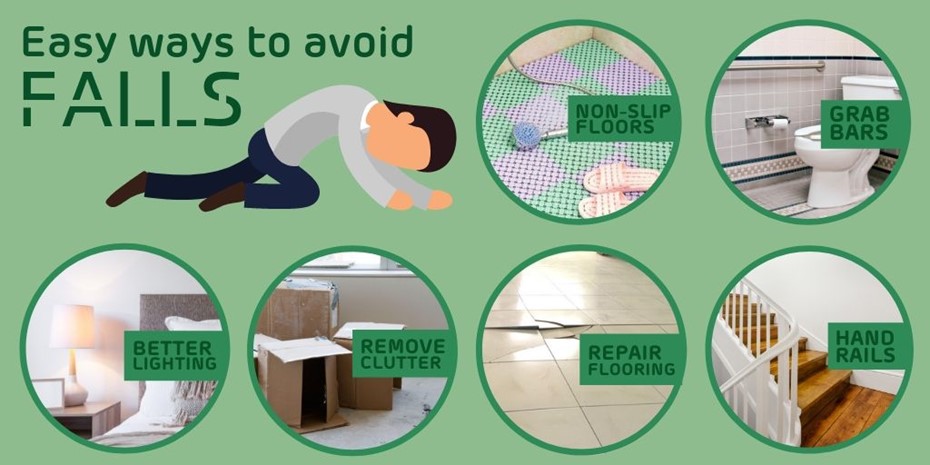- Home
- Residential Aged Care
- Home Care
- Retirement Living
- Support Services
- Aged Care Jobs
- Request Shortlist
on Monday, August 12, 2019
In Australia, one in three people over 65 experience a fall each year. If you think that’s a worrying statistic, you’re right. Falls are the leading cause of hospitalisation for Australian seniors, with an average of seven days spent in hospital following a slip, trip or stumble.
While only one in five falls causes a serious injury, when they do happen, they can be devastating. 38% of injuries from falls are hip and thigh fractures and 20% are head injuries. In fact, more than 95% of hip fractures are caused by falling, and falls are also the most common cause of traumatic brain injury.
Why fall prevention is so important
With all of that said, it’s clear that falls are a major health concern for older Australians. Falls are often the catalyst for a loss of independence, and just one bad fall can set off a domino effect.
One incident turns into a fear of a falling, which then results in the person limiting their movements. Of course, this is counterproductive – avoiding activities means we become less active, and over time, we become weaker and increase our risk of falling.
What puts you at risk of falling?
It’s important to recognise that falls are not a ‘normal’ part of ageing and are preventable.
For over 65s, the biggest risk factors for avoidable falls are:
Thankfully, there are a number of tips to help you reduce your risk of falling.
Tip 1: Build your balance
Balance means you can stand, walk, go up a flight of stairs or dance unattended.
Good balance relies on your brain communicating with your muscles, joints, eyes and ears. All of your systems need to work together so you can react quickly in a risky situation and stay stable.
The best way to avoid a bad fall is to build good balance. Some activities that help you do that include:
It’s also important to address any foot issues that might be affecting your balance.
Talk to a podiatrist about any concerns you might have, and ensure you always wear supportive footwear that helps you maintain your balance.
Tip 2: Improve your strength
Muscle mass declines with age, so it’s important to maintain your strength as much as possible, particularly in your legs.
Making and maintaining the habit of being physically active is the best way to stay strong. But don’t stress – your strength training routine doesn’t have to be strenuous.
Some everyday strength training exercises include:
Tip 3: Give your body what it needs
A healthy diet and lifestyle ensures your body has all the nutrients and vitamins it needs to work as it should.
Calcium is especially important for bone development, while Vitamin D is needed to absorb the calcium. So make sure you eat plenty of calcium-rich foods, such as:
Of course, when it comes to calcium any good intentions will go to waste if you’re Vitamin D deficient. The best way to fill your Vitamin D quota is sunlight – so make sure you get your fair share of fresh air and sunshine!
It goes without saying that being under the influence of alcohol increases your risk of a bad fall, so it’s also wise to only drink in moderation.
Tip 4: Improve your vision
Our vision tends to change as we get older. If things have gradually been declining, you might not notice that it’s time to make adjustments to your prescription or even get a prescription for the first time.
Since bad vision is a big risk factor for falls, make sure you have your eyes checked at least once a year.
To help improve your vision, you should:
Tip 5: Remove hazards around the home

It’s important to make sure your environment is risk-free, too.
If you want to avoid falls at home, you need to remove any hazards. Some of the fixes are simple, and some might require a contractor – but if you’re serious about your wellbeing, it’s worth the investment.
To reduce your risk of falling at home, you should:
Ask for help if you need it
If you have any mobility concerns, make sure you talk to a health professional, like your GP, physiotherapist or occupational therapist.
They will evaluate your risk and discuss strategies to help you improve your balance and strength.
Many over 65s have access to a government-funded Home Care Package, which provides extra assistance to help you maintain your independence in and out of home.
Home Care Packages can also cover allied health services, like a physiotherapist designing an exercise plan to reduce your risk of falls, or an occupational therapist coming in to assess your home's safety.
Brightwater's team of support workers and health professionals visit homes all over Perth, providing a range of services to keep your home, health and happiness in order.
Join 10,000+ subscribers for the latest news
